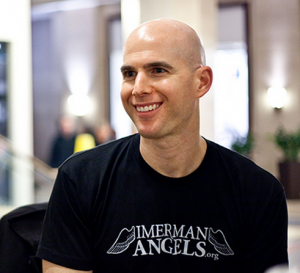

Diagnosed with testicular cancer when he was 26 years old, Imerman quickly learned that newly diagnosed cancer patients feel alone and afraid, and that support is key to improving mental and physical health.
Started in 2006, Imerman Angels now has a roster of over 6,000 cancer survivor mentors and caregivers. Over 400 different types of cancer are represented. Many staff members are also cancer patients and the small group runs largely on donations. Every effort is made to connect people with the same type of cancer, of similar age from the same city or town.
Imerman Angels operates in over 60 countries and when patients are not close geographically, they rely on social media and Skype to connect. Imerman mentioned that often, patients from other countries wanted to be matched with a US treated patient survivor as they respected US medical care and wanted to ask specific questions about treatment.
Imerman Angels accepts people of any age. Although initially, most patients were young adults, the average age has gone up significantly and currently is around 50 years old.
Imerman explained that the organization’s mission was getting cancer patients together, one-on-one, to share experiences and make the journey easier.
“Our whole mission is so simple. If somebody is diagnosed with cancer, any type of cancer, anywhere in the world, there’s a survivor out there living with the same cancer and going through the same thing, and that person can help. Putting these people together in the same room is our goal, to empower the newly diagnosed patient by having him meet someone who has already been there.”
I asked if his patient mentors went through any specific training and Imerman answered,
“Yes, we talk to all patients and mentors and assess both parties and then make the best match. We talk to the patients and get to know them and figure out what they need. We talk to the mentors and make sure they understand how best to help the patients and support them through their diagnosis, treatment and life with the disease.
We have a training manual and a medical advisory board of PhDs, MDs, psychologists, social workers, nurses that helps us with the training program. We want to make sure that mentors understand their role.
We make a match only after we have assessed both parties and the mentor has completed the training.”
I asked about follow-up after the initial matching process. Imerman answered,
“Oh yes, you have got to check in. You cannot assume that the match on paper is going to be the best match. After 3 weeks, an automatic email is generated and sent to both sides asking if they connected, if they are satisfied, if they have questions or want to change anything at all. If there is any hesitation, we will look into the situation and change it.”
I was curious about the reception that Imerman Angels gets in medical institutions from doctors, nurses and the rest of the medical staff. Imerman was very enthusiastic.
“Almost 100% if not 100% of the hospitals are extremely receptive to us, that’s not the problem. They are all saying – ‘Wait, this is free? And it helps my patients? You’re going to do this program for us; we don’t have to think about matching patients within our own clinic? This is great!’
Many of the local Chicago hospitals sponsor our events. We have spoken at Mayo, City of Hope, MD Anderson, USC, Dana Farber. They love what we do and they believe in it. The problem is always keeping us on their mind. They are doctors and medical staff and they are trying to cure patients; I get it! But we want to make sure they keep us in the forefront of their mind going forward and refer their patients to us.”
Imerman firmly believes in online support groups. He loves it when people use his one-on-one approach and also join online groups or participate in local group meetings.
“It’s so individual. I think that people that are interested should take advantage of all that is out there. Find a support group; find a mentor through us that you can talk with. Find out what suits you best.”
The biggest challenge for Imerman Angels is growth. Last year, they helped a total of 2300 people, and they did this with a staff of 9.
“Our biggest challenge is learning how to grow. One thing that our board has helped us do right is that we are very mission-focused. One-on-one peer support for cancer patients. That is our mission. We want to own that space and do the best we can do”
For the future, Imerman says that they just want to grow and expand the mission to include more patients.
“Our plan is to reach from thousands to tens of thousands to hundreds of thousands to millions of people. The more people we reach, the happier we are.”
Please visit the Imerman Angels website to learn more about this great organization.
Resources:
http://www.cnn.com/2012/08/23/health/cnnheroes-imerman-cancer
https://www.facebook.com/ImermanAngels
http://www.huffingtonpost.com/jonny-imerman/cancer-support_b_2442697.html